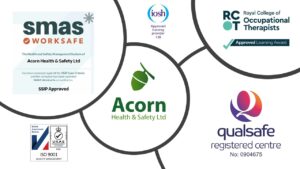
Did you know that in occupational health and safety law and practice take place every April and October with the HSE (Health and Safety Executive)? One piece of important legislation which has recently been updated is The Health and Safety (First-Aid) Regulations 1981 which now contains:
■ emphasis on employers’ responsibilities to take account of employees’ mental health in their first-aid needs assessment;
■ changes to the term ‘catastrophic bleeding’ to ‘life-threatening bleeding’ with more guidance on what employers should do if they identify this as a risk in their workplace;
■ simplified guidance on first-aid training providers.
So, what does this mean for you?
This latest update prompts employers to integrate mental health needs into their first aid needs assessments to ensure staff are given the full mental health training/knowledge they require. These updates really highlight the importance of addressing ALL aspects of employee safety and well-being, and recognises not just physical but mental wellbeing too taking a holistic approach to Health and Safety in the workplace, aligning with integrating the upward trend in integrating mental health and wellbeing into all health and safety practices.
During the pandemic a lot of training had to become online, however certain aspects such as performing CPR, is just something that can not be done online. The new guidance now accepts explicitly that blended learning is an accepted means of delivering first-aid training. However, we suggest that will be dependent on the business’ first-aid needs assessment as to the suitability of blended learning. Things such as the correct technology being accessible to the learner/delegate, that the training provider offers adequate support (if it’s not a live course) and ensuring there are robust systems in place to prevent identity fraud. There also need to be appropriate means of assessing e-learning components. For our specific e-learning courses, we consciously chose a provider whose courses all have external accreditation by nationally recognised organisations and we like the fact that the training is presented using a blended approach.
Additionally, the new guidance emphasises on selecting accredited and well-regulated training programs (such as ours) which signifies quality assurance in ensuring effective first aid training. It has streamlined the selection process and the quality assurance focus, along with the suitability of trainers and blended learning, which aims to make training compliance simpler for employers by setting very clear standards for delivery and course content. The employers must be confident in the training provider’s ability to deliver high quality training with appropriate content that meets legal guidelines, use suitable qualified trainers and assessors, and have relevant and robust quality assurance systems in place.
We offer a variety of Mental Health First Aid courses that can be done in person or online. These courses provide essential training on identifying, understanding, and supporting individuals experiencing mental health issues. The in person (face to face) courses allows for direct interaction with the trainer and allows delegates to ask questions in a live training situation, helping them gain a deeper understanding of the content. The online training allows delegates to learn at their own pace at a time suitable for them.
There are also now government-backed schemes offering Schools grants for Mental Health First Aid training. Some schemes are providing grants to schools and colleges of up to £1,200 to facilitate training in mental health awareness.
Every company is different so it is essential for each individual company to assess their specific needs and provide appropriate training to meet the mental health requirements of their staff. This can involve staff surveys to assess the workforce’s mental health needs and help you in selecting training programs that align with those needs. When considering these options and tailoring training programs to their specific requirements, you can effectively address your employees mental health needs and help to create a supportive and inclusive work environment.
You can view our accreditation’s and certificates here (including our ISO 9001:2015 Certified for Health and Safety Consultancy and Training Certificate) and our testimonials here about our fantastic courses and trainers.
Our Qualsafe accredited training programs are well-regulated and meet the required HSE standards, making them an optimal choice for employers looking to comply with the guidance and providing effective first-aid education for the workplace.
There has also been a change in terminology from the term “catastrophic bleeding” to “life-threatening bleeding”. There is also additional guidance on employer actions in such an event if it is identified as a risk in the workplace. They have changed this with the aim to enhance clarity and accessibility. This change ensures the guidance remains aligned to current medical terminology and first-aid best practices. It also provides detailed actions for employers to take if such a risk is identified.
To summarise, the NEW 2024 HSE guidance has introduced several notable changes to workplace first aid practices which aims to enhance workplace safety and support. By emphasising the need for mental health considerations and providing clear criteria for selecting training providers, these updates highlight the importance of addressing all aspects of employee well-being and ensuring quality assurance in ensuring effective first-aid training.
You can read the full HSE guidance document here. If you would like to discuss how we can meet your training requirements please feel free to contact us
